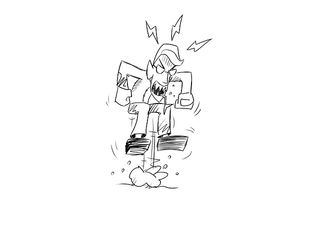
Anger
Ridding Happiness Contaminant 6: Anger
Don't let resentment, bitterness, and indignation run you down
Posted February 29, 2016

There are four powerful emotions that, when experienced, will contaminate peace of mind and cripple happiness. They are anxiety, depression, guilt, and anger.
When people show up in my office suffering with the first three – anxiety, depression, guilt – they invariably want to be rid of them. Why? Because these feelings are both painful and intrusive, making it difficult to focus on and enjoy one’s family, friends, work, and recreation. They are thusly motivated to put forth effort to uncover the cause of these pernicious feelings and be rid of them.
But, this is not always the case with regard to the happiness contaminate of anger. Many people who suffer from this kind of emotional pain stubbornly want to hold onto it. Why? Because they harbor any number of mistaken ideas, such as…
1. If I let go of my anger, this lets the person who offended me off the hook; he or she will then think what was done was okay.
2. If I let go of my anger, I will lose my motivation to assertively act to correct the injustice done to me.
3. If I let go of my anger, I will betray myself by not holding a grudge against the person who offended me.
4. If I let go of my anger, I would have to sacrifice my sense of self-righteousness, which feels empowering and is my just due as a result of being treated shabbily.
5. If I let go of my anger, I will be responding abnormally since anger is an appropriate, healthy response to a grievance.
As a clinician, I know that I have to help my patients counter these type beliefs, as otherwise they will be unwilling to work to relinquish their anger. I do my best to help them think them through, using the arguments presented below, so that they can move past their anger and turn their full attention to eradicating the root cause of their anger. Here are the arguments.
1. By relinquishing your anger, you do not concurrently give up your conviction that the other person indeed did wrong. Furthermore, without anger, you can still tell the other person how offensive you found his/her behavior and that, while you do not condemn him/her for it, you do indeed condemn what he/she did.
2. You do not need to carry the painful feelings of anger inside you to spur you to assertive, corrective action. Indeed, your belief that what was done was wrong will suffice to motivate you. Furthermore, without anger, you will be much more likely to act in a constructive way to bring about a satisfying resolution.
3. Letting go of anger in no way dishonors you. Why? Well, for two reasons. One, without anger, you still retain your conviction that you deserve to be treated kindly, respectfully, and fairly, thereby honoring yourself with your own values. Two, by holding onto your anger, you yourself dishonor yourself in that you cause yourself to suffer two insults for the price of one; there is the egregious behavior from another that you had to experience, plus, in addition, the ongoing emotional pain of your own anger. In other words, holding onto the anger keeps you stuck in the past, reliving over and over again the original insult, as well as also suffering the pain of your anger in the present.
4. The pleasure one gets from righteous indignation must be weighed against the suffering one experiences from keeping the anger near and dear. Wouldn't life be so much better being peaceful, happy, and fully engaged in one's life going forward? Maybe happiness is indeed the best revenge.
5. Despite popular opinion, anger is not a healthy emotion to experience. I know this may sound heretical to many, but it derives from irrational ways of thinking, as I will show momentarily. Furthermore, every second a person spends angry, that person cannot experience peace, happiness or joy. Moreover, it interferes with the focus, motivation, and stick-to-itness needed to produce valued results, not to mention often prompting retaliatory behavior from others that often escalates a bad situation into a worse one.
I hope that I have intrigued you enough to read on. In what follows, I will explain what causes your anger and what to do about it.
The ABC's of Anger
To rid the emotional contaminant of anger requires you to understand exactly what causes it. Most people think that their anger is caused by the rude, obnoxious, and/or unfair behavior of other people. They fall into what I call the “He/She/It makes me syndrome,” as in “He made me angry when he said that,” “The way she acts really gets under my skin,” “It pisses me off.”
Actually this is not the case. Through thousands of research studies and hundreds of thousands of case examples, we know that anger is caused, not by what other people do, but by the way we think about, frame, or make judgments about what others do. In other words, we cause ourselves to experience anger by our own thinking.
Let me briefly illustrate. Jim and Beth both had to endure the emotional overreactions, outbursts, and belligerent behavior of their troubled, rebellious teenage son, Ian. But, they each framed the provocations he provided quite differently. Beth took the attitude: “I sure hate the way Ian acts, but what do you expect, given that he's a troubled teen with serious emotional problems.” By thinking this way, she felt both frustration and sadness, but no anger, and she focused her attention on getting him the help he needed, all without further inflaming the situation. Jim took an entirely different attitude. He thought, “Damn him, he shouldn't act like that, the little snake.” This thinking stimulated his anger, causing him to yell and rail at Ian, thereby provoking even more obnoxious behavior from his son in turn.
The example of Beth and Jim nicely illustrates the ABC's of anger. The A stands for the Activating Event, the thing about which we respond with anger. In this case, it was Ian's provocative, disrespectful behavior. The B is the Belief one takes of the A. It can be rational, like Beth’s, or it can be irrational, like Jim’s. The belief one holds at B then determines one's Emotional Consequences at C. For Beth, it was frustration but no anger. For Jim, it was frustration plus anger.
So, it is not the Activating Event (the A) that causes the Emotional Consequence (the C) of anger, but the irrational Beliefs (the B) one holds about the Activating Event. Jim and Beth together illustrate exactly what kinds of beliefs inevitably lead to anger. They are as follows, often in the sequence articulated below:
1. A rational dislike belief, as in, “I don't like the way he's acting and want him to stop it.” This is rational because the person acknowledges his or her value to be treated well and for appropriate behavior from others. Furthermore, to give this up this belief would render a person passive such that he or she would tolerate the obnoxious behavior. Interestingly, both Beth and Jim held this rational belief. But they individually went in different directions thereafter. Beth added, “But, he's a fallible human, a troubled one at that, and is thus to be expected to make mistakes and have faults; now, without anger, what can I do constructively to bring an end to it.” To the contrary, Jim went the further route of the two irrational beliefs below.
2. Then an irrational perfectionistic belief, as in, “He shouldn't act that way, dammit.” Thinking this way takes any person, including Jim, from displeasure and frustration to anger. But this perfectionistic thinking is irrational for several reasons: (1) it demands that a person be perfect, never acting badly or having faults; (2) in fact, given that human behavior is partly cause and effect (in that, since all the conditions necessary for someone to act a certain way are present, while none of the conditions are present to prevent this behavior, a person has to or must act that way), it represents a refusal to accept reality; (3) it is illogical, for it doesn't follow that, because a behavior is inappropriate or not liked, it shouldn't be; (4) it is narcissistic in that it communicates that, because I don't like it, he shouldn't do it; and (5) it indirectly damns the person as rotten for daring to act in this fallible, imperfect way.
3. Finally, an irrational damning belief, as in, “the little snake.” This thinking is irrational because it takes a giant leap from damning what the person did to damning the total person. Though Ian indeed acted snakily at times, he hardly did so all the time, nor did he only possess this one obnoxious quality. So, damning the person renders that person always and only that one quality, communicates that the whole person, not just the behavior, is damnable, and provides one the righteousness to seek revenge.
Ridding Anger
So, anger is caused by a double-dose of irrational thinking, not by the obnoxious behavior of another person. The first dose is absolutely and perfectionistically demanding that the aggrieving person should not have acted badly. The coup de grace is then damning the person for daring to have so acted.
I want to emphasize before going forward that anger is a choice. You certainly are free to hold onto your anger if you'd like. But, you're also free to let it go if you see how foolhardy it is with regard to your full engagement in life and your pursuit of happiness.
If you decide you no longer want to live with your anger, you would be wise to be careful of the strategies you employ. Many psychotherapists recommend distraction and/or release methods to help their clients counter their anger – counting to 10, vigorous exercise, meditating. While these may serve to dissipate the build up of anger feelings at the moment, they are inelegant in that they do not correct the root cause of the anger, the irrational beliefs. Thus, the next time a person faces the same or a similar Activating Event, he or she will likely think the same way at B as before and thereby respond similarly with another angry episode.
The elegant way to rid yourself of anger, then, is to first relinquish the beliefs that cause it and then to re-indoctrinate yourself with more rational ways of thinking. Below are the three core beliefs that, if endorsed and adopted, will help you lead a life free of the happiness contaminant of anger.
1. I have a right to want respectful, appropriate, and fair behavior from others. When they do not comply, I can, if I so desire, assertively communicate with them about my displeasure, preferably without anger, so as to have the best chance to be heard and get satisfaction.
2. All people, because of their innate human fallibility, will possess idiosyncrasies and faults and will on occasion act badly, sometimes even toward me. I need not like it when they do, but it is foolhardy of me to not expect such grievances on occasion from them and to demand that they never step on my precious toes. To say it another way, all people, because of their human imperfection, must act badly, and they must do so when they do, not at my convenience or only after my permission.
3. While I may dislike and even damn another’s inappropriate behavior, it is not logical or appropriate to generalize from this one behavior or personal flaw and thereby damn the whole person as bad, worthless, or despicable. In other words, he or she is not rotten for acting rottenly.
What follows, then, is a six-step process to help you eliminate your anger- producing irrational thinking and indoctrinate yourself with anti-anger perspectives. I suggest that you reserve a standard time each evening of about 15 to 30 minutes to do the steps until you finally habituate your new way of thinking.
Step One – Identify Your Anger And Take Responsibility For It. Review your day and pinpoint any moments in which you experienced anger. This feeling is the C in the ABC model. Remind yourself that, no matter how egregious someone may have acted, you are responsible for creating your own anger by virtue of your irrational thinking.
Step Two – Pinpoint The Activating Event. What happened about which you feel angry? Who did or did not do what? Again, affirm that, while what happened may be egregious and may even require a response, this event did not cause you to be angry. It was your own irrational thinking.
Step Three – Ferret Out Your Anger-Producing B’s. Reflect on your thinking. What was the belief or self-talk in your head just before you experienced your anger? As with Jim, the angry father described earlier, specifically look for the thoughts whereby you demand perfection from the other person (e.g., “He/she shouldn't have done that.”) and that damn him or her (e.g., “The little snake.”). Try very hard to put these thoughts into full sentence form as if you actually thought them out consciously this way. These thoughts are what you must rid in order to live without the happiness contaminant of anger.
Step Four – Debunk Your Irrational Beliefs. In this step, you hold your anger-causing beliefs up as hypotheses to be critically debated, disputed, and debunked, not ones to just swallow as true because you've always thought this way. Ask: Is it really true or valid that he/she shouldn't have acted badly? Is it true or valid that he/she is a total snake for acting snakily? To help convince yourself that your beliefs are indeed irrational, turn to the arguments I used to refute Jim's irrational thinking about his son Ian earlier in this blog.
Step Five – Re-indoctrinate Your Thinking. The last step requires you to supplant your perfectionistic demands and damning characterizations of the other person with beliefs that are more logical, data-based, and supportive of personal happiness. For example, Jim would rehearse over and over something along the lines of his wife’s thinking, as per: “I hate how Ian acts, but I guess it reflects that he’s a troubled kid. Now what do we need to do to get him help?”
Step Six – Act Assertively, If Appropriate. Without anger, you now have a decision to make. Do you address the issue with the person who behaved badly toward you, or do you simply ignore it and move on? Sometimes it's best to just chalk up the offensive behavior as “Just one of those things;” other times it may be important to address it directly and assertively. There is no rulebook here, so judgment is required. But, without the contamination of anger, you are well-positioned to use your best judgment to decide what is your next best course of action.
Please remember that one or two run-throughs of the six-step process will be insufficient for you to let go of your anger. You will need to engage in this process many times, over and over, until more rational ways of thinking become engrained. Then, without your anger you are free to pursue the happiness you want and deserve in life.
Going Forward
Along with anxiety, depression, and guilt, anger is an emotional contaminant to happiness. Fortunately, anger is an emotion that we can live without, while capturing the best of two worlds: on the one hand, we can hold tight to our values and act assertively when people aggrieve us; on the other, we do not need to suffer the pain of anger in the process. A real win-win.
I hope this blog will be helpful to you in your pursuit of happiness. It can be if you buy into what the ABC's communicate about the cause and cure of anger and work the six-step anti-anger process. Remember, though, that the healthy, rational thinking that frees you from the contaminant of anger will take time, energy, and effort on your part. But you're worth the effort. I know so, and hope you do too.
Please feel free to contact me at anytime by email. In the meantime, live healthy, happily, and with passion.
Russell Grieger, Ph.D. is a licensed clinical psychologist in private practice in Charlottesville, Virginia. The author of several self-help books, all designed to empower people to create a life they love to live, he invites you to check out his new relationship happiness book, The Couples Therapy Companion; A Cognitive Behavior Workbook. You may contact Dr. Grieger for questions or for more information at grieger@cstone.net



